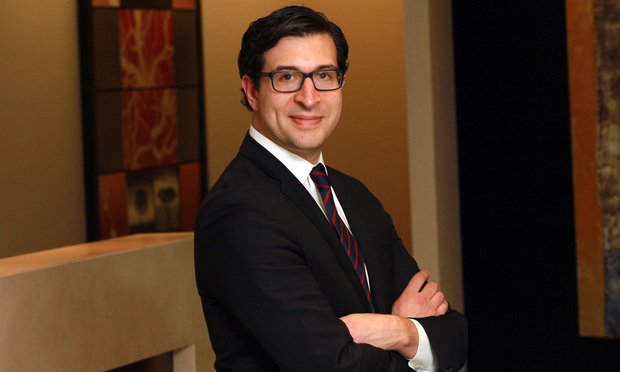Federal Prosecutor Ghali Rejoins Bondurant to Lead Cybersecurity Group
Kamal Ghali is heading back to Bondurant Mixson & Elmore after six years prosecuting cybercriminals and economic fraudsters for the Atlanta U.S. attorney's office.
January 11, 2019 at 10:59 AM
4 minute read
 Kamal Ghali, Bondurant Mixson & Elmore, Atlanta. (Photo: John Disney/ALM)
Kamal Ghali, Bondurant Mixson & Elmore, Atlanta. (Photo: John Disney/ALM)
Federal prosecutor Kamal Ghali has returned to Bondurant Mixson & Elmore after six years as an assistant U.S. attorney for the Northern District of Georgia, where he prosecuted economic fraud cases and rose to deputy chief of the cyber and intellectual property crimes section.
“I loved being an assistant U.S. attorney, and I worked for three amazing U.S. attorneys, Sally Yates, John Horn and BJay Pak,” Ghali said.
Ghali decided to make the move to Bondurant because of a “strong entrepreneurial drive,” he said. “I always wanted to build my own legal practice, especially in areas I'm really passionate about.”
Ghali, who joined Bondurant on Jan. 7 as of counsel, is leading the cybersecurity practice for the firm, which handles complex and business litigation. He also will handle white-collar criminal defense cases arising from government investigations.
Bondurant does not recruit lateral partners, but Ghali worked there for three years as an associate before landing the federal prosecutor job in 2012.
“We are delighted that he is coming back home,” said Bondurant partner John Floyd. “Kamal's experience leading some of the most sophisticated cyber investigations and trials in the country will help our clients navigate the wide spectrum of legal challenges that cyber threats present.”
Ghali prosecuted both economic fraud and cybercrime cases at the Northern District.
With Alison Prout and lead prosecutor Thomas Krepp, he prosecuted a five-week investment fraud trial last fall against the owners of Sterling Currency Group—a large Iraqi dinar currency exchange that attracted $600 million from investors eager to get rich from its promises that the Iraqi government was set to revalue the dinar. Co-owners Tyson Rhame and James Shaw with COO Frank Bill were each convicted of multiple counts of mail and wire fraud by a federal jury.
One major cyber case that Ghali prosecuted with AUSAs Steven Grimberg and Scott Ferber led to the 2015 conviction of “one of the world's most nefarious malware developers,” according to special agent J. Britt Johnson of the FBI's Atlanta field office, who led the investigation.
Russian hacker Aleksandr Andreevich Panin developed an easy-to-use banking Trojan horse malware, called Spyeye, that cybercriminals deployed to infect over 50 million computers globally, causing close to $1 billion in harm to individuals and financial institutions.
Panin received a 9½-year sentence, and Algerian hacker, Hamza Bendelladj, a key promoter and user of Spyeye, is serving 15 years.
Atlanta is one of the leading U.S. attorney offices for prosecuting cyber cases, Ghali said, explaining that the perpetrators for many cyberattacks are global, and the attack could hit several cities at once.
“We have a very forward-leaning FBI field office that has been at the forefront of some large cyber cases,” he said, noting that the Atlanta FBI office led the Spyeye investigation.
Atlanta also is home to many corporate headquarters, including those of a number of large companies that have reported breaches. “And those are just the ones publicly reported,” Ghali said, adding that the FBI's Atlanta field office receives hundreds of calls about cyber breaches every year.
The cybercrimes unit for the Atlanta U.S. Attorney's Office started out as a unit of the economic crimes section until incoming U.S. Attorney BJay Pak made it a separate section a year ago, with Ghali and Nathan Kitchens as deputy chiefs and Doug Gilfillan as chief.
Gilfillan also returned to private practice recently, joining Kilpatrick Townsend Stockton & Crews as a partner in October. Pak has not yet announced a new cyber chief.
This content has been archived. It is available through our partners, LexisNexis® and Bloomberg Law.
To view this content, please continue to their sites.
Not a Lexis Subscriber?
Subscribe Now
Not a Bloomberg Law Subscriber?
Subscribe Now
NOT FOR REPRINT
© 2025 ALM Global, LLC, All Rights Reserved. Request academic re-use from www.copyright.com. All other uses, submit a request to [email protected]. For more information visit Asset & Logo Licensing.
You Might Like
View All
12-Partner Team 'Surprises' Atlanta Firm’s Leaders With Exit to Launch New Reed Smith Office
4 minute read
After Breakaway From FisherBroyles, Pierson Ferdinand Bills $75M in First Year
5 minute read
On the Move: Freeman Mathis & Gary Adds Florida Partners, Employment Pro Joins Jackson Lewis
6 minute read
Veteran Litigators Move From Sidley Austin to Alston & Bird's New Chicago Office
3 minute readTrending Stories
- 1'A Death Sentence for TikTok'?: Litigators and Experts Weigh Impact of Potential Ban on Creators and Data Privacy
- 2Bribery Case Against Former Lt. Gov. Brian Benjamin Is Dropped
- 3‘Extremely Disturbing’: AI Firms Face Class Action by ‘Taskers’ Exposed to Traumatic Content
- 4State Appeals Court Revives BraunHagey Lawsuit Alleging $4.2M Unlawful Wire to China
- 5Invoking Trump, AG Bonta Reminds Lawyers of Duties to Noncitizens in Plea Dealing
Who Got The Work
J. Brugh Lower of Gibbons has entered an appearance for industrial equipment supplier Devco Corporation in a pending trademark infringement lawsuit. The suit, accusing the defendant of selling knock-off Graco products, was filed Dec. 18 in New Jersey District Court by Rivkin Radler on behalf of Graco Inc. and Graco Minnesota. The case, assigned to U.S. District Judge Zahid N. Quraishi, is 3:24-cv-11294, Graco Inc. et al v. Devco Corporation.
Who Got The Work
Rebecca Maller-Stein and Kent A. Yalowitz of Arnold & Porter Kaye Scholer have entered their appearances for Hanaco Venture Capital and its executives, Lior Prosor and David Frankel, in a pending securities lawsuit. The action, filed on Dec. 24 in New York Southern District Court by Zell, Aron & Co. on behalf of Goldeneye Advisors, accuses the defendants of negligently and fraudulently managing the plaintiff's $1 million investment. The case, assigned to U.S. District Judge Vernon S. Broderick, is 1:24-cv-09918, Goldeneye Advisors, LLC v. Hanaco Venture Capital, Ltd. et al.
Who Got The Work
Attorneys from A&O Shearman has stepped in as defense counsel for Toronto-Dominion Bank and other defendants in a pending securities class action. The suit, filed Dec. 11 in New York Southern District Court by Bleichmar Fonti & Auld, accuses the defendants of concealing the bank's 'pervasive' deficiencies in regards to its compliance with the Bank Secrecy Act and the quality of its anti-money laundering controls. The case, assigned to U.S. District Judge Arun Subramanian, is 1:24-cv-09445, Gonzalez v. The Toronto-Dominion Bank et al.
Who Got The Work
Crown Castle International, a Pennsylvania company providing shared communications infrastructure, has turned to Luke D. Wolf of Gordon Rees Scully Mansukhani to fend off a pending breach-of-contract lawsuit. The court action, filed Nov. 25 in Michigan Eastern District Court by Hooper Hathaway PC on behalf of The Town Residences LLC, accuses Crown Castle of failing to transfer approximately $30,000 in utility payments from T-Mobile in breach of a roof-top lease and assignment agreement. The case, assigned to U.S. District Judge Susan K. Declercq, is 2:24-cv-13131, The Town Residences LLC v. T-Mobile US, Inc. et al.
Who Got The Work
Wilfred P. Coronato and Daniel M. Schwartz of McCarter & English have stepped in as defense counsel to Electrolux Home Products Inc. in a pending product liability lawsuit. The court action, filed Nov. 26 in New York Eastern District Court by Poulos Lopiccolo PC and Nagel Rice LLP on behalf of David Stern, alleges that the defendant's refrigerators’ drawers and shelving repeatedly break and fall apart within months after purchase. The case, assigned to U.S. District Judge Joan M. Azrack, is 2:24-cv-08204, Stern v. Electrolux Home Products, Inc.
Featured Firms
Law Offices of Gary Martin Hays & Associates, P.C.
(470) 294-1674
Law Offices of Mark E. Salomone
(857) 444-6468
Smith & Hassler
(713) 739-1250






